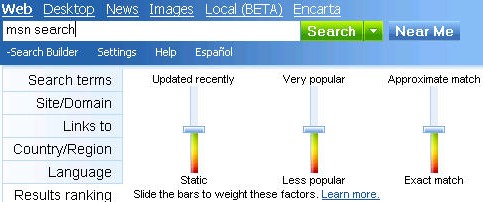Andy Edmonds and Erik Selberg, part of the team at MSN Search, did an interview and talked about MSN Search technology. They also discussed the ways MSN is improving search results and what search could look like in the future.
MSN is the newest search engine in the market today and capitalizes on groundbreaking technology the other search engines do not use currently – Neural Networks. Neural networks are machines modelled after the cognitive abilities (Artificial Intelligence) of human thoughts.
Neural networks essentially enable the search engine to learn from user behavior and improve on results over time. Rather than the use of algorithms like what Google and Yahoo search engines use, this enables it to learn from input given to it on a continuous basis. Therefore, if a result is clicked on more often than another higher in the results, it can be considered more relevant and useful to the web searcher. Studying why it is being clicked on more often could help it determine how authoritative a site is. It results in more dynamic results that are not constrained by the rules pre-programmed at the start.
Like any search engine, it has vulnerabilities. It does, however, have the edge in that it is flexible. It has the ability to expand it’s capabilities infinitely as compared with algorithm-based search engines like Google and Yahoo. Because it is a self-learning machine, it can be taught new ways very quickly and have a greater influence on results. As index size grows larger over time, it will result in more information you would want as well as more of the information you would consider junk. With a neural network, the ease of scalability is not as big of an issue as the others would encounter. Andy and Erik also discussed the search engine’s ability to deal with splogs which can be combated with their technology over time.
On of the great features of MSN search is the ability to use their Search Builder function which offers a slider tool shown here:

Under the Results Ranking tab, you can calibrate and fine-tune your results based on three factors: update recency, popularity, and matching level to the term entered.
They also discussed in general terms what a webmaster can do to aid the search engine spider be more effective at indexing and ranking pages. While they weren’t specific for fear that search engine spammers will use the information unscrupulously to manipulate results, we know some of the basic tenets of a well SEO’d page. They are:
Pages designed with these basic factors in mind help the search engine spider index and categorize your site properly. The rankings will depend largely on several factors which Andy and Erik refer to as:
So it’s not just about relevancy. While older engines like WebCrawler counted the number of links as a measure of importance, MSN looks much further. The importance and reputation of the sites linking to yours plays a major factor in calculating the trust factor discussed in an earlier article about TrustRank . It also tracks your site’s ability to solve the needs of the searcher through web tracking (which is being employed by all the search engines currently).
The MSN search team also discussed the issue of “Results Diversity” which doesn’t rank sites based largely on relevancy factors but also offering a variety of choices to the search user. If you were searching for a computer for example, it would offer you 3 types of choices and let you choose which is more suitable. The engine would not know whether you entered the term because you were ready to buy a computer, or whether you were researching a future purchase, or just randomly surfing. To cater to the larger audience and to avoid guessing, it would return the greatest mix of sites possible for you to view.
Conceptually speaking, MSN seems to have the edge in the future as far as search market goes. Their fluid ability to adapt and evolve, delivering results that search users want to see will be the key to capturing the hearts and minds of users. As quality of results improve, you start to see them chipping away at the market share from the top two search engines.